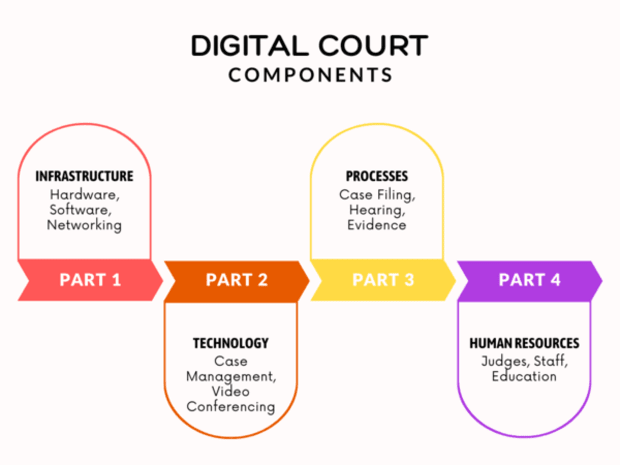Research Report Released to Explain the Status of Digital Courts in India
Research Report Released to Explain the Status of Digital Courts in India
While the legal profession is undergoing a seismic shift, the jobs of traditional lawyers and judges will soon be replaced by domain experts who possess hybrid skills covering law, language, communications, and knowledge of the latest technology.
By Rakesh Raman
A new research report “Decayed Digital Courts of India” highlights the official plans of the Supreme Court of India to introduce technology in the judicial processes. It also assesses the current level of technology usage, and offers recommendations to develop digital courts in the country.
The editorial sections in the report cover the status of Indian judiciary, plans of using technology in courts, digital infrastructure in Indian courts, untrained workforce in courts, the emerging concept of digital courts, and so on.
In its recommendations, the report describes various options to develop digital courts and what Indian judiciary can learn from global trends including dedicated digital platforms for legal applications. It also offers suggestions to provide training to law professionals – including lawyers, judges, and court staff – so that they could embrace digital technology in courts.
The report concludes that if the Supreme Court or other Indian authorities plan to provide just, transparent, and efficient services based on the constitution to the citizens, they need to use the right technology for the legal processes.
The technology usage is not only required for backend processes, but technology-based services such as instant messaging, help desks, chatbots, etc. are also required to be introduced to interact with litigants in an always-on environment.
The technology introduction drive in courts should be supplemented by specialized education in law colleges and universities, which currently provide run-of-the-mill education with obsolete syllabuses and ineffective pedagogy to students.
The current law education is only producing some ordinary, strait-jacketed lawyers or judges who fail to perform effectively in the courts. Consequently, as global reports show and as it is visible to all, the performance of Indian legal services is going from bad to worse.
While the legal profession is undergoing a seismic shift, the jobs of traditional lawyers and judges will soon be replaced by domain experts who possess hybrid skills covering law, language, communications, and knowledge of the latest technology.
In the emerging tech-based legal paradigm, it will not be possible for those people to survive who cannot use high-end English because all the software systems and digital platforms are designed in English language and the legal profession is increasingly getting globalized.
The 23-page “Decayed Digital Courts of India” research report has been compiled and released by Raman Media Network (RMN) Company [ RMN News Service ], which has been working in diversified content creation, management, and distribution businesses on a global scale for the past 12 years.
The author / editor of this report Rakesh Raman is a national award-winning journalist who won the government award for his work particularly in technology journalism. Besides working at senior editorial positions with leading media companies, he was writing an exclusive edit-page tech business column (named Technophile) regularly for The Financial Express, which is a daily business newspaper of The Indian Express Group.
Earlier, he had been associated with the United Nations (UN) through the United Nations Industrial Development Organization (UNIDO) as a digital media expert to help businesses use technology for brand marketing and business development.
The 23-page PDF report is given below. You can also click here to download the report.
By Rakesh Raman, who is a national award-winning journalist and social activist. He is the founder of the humanitarian organization RMN Foundation which is working in diverse areas to help the disadvantaged and distressed people in the society.















